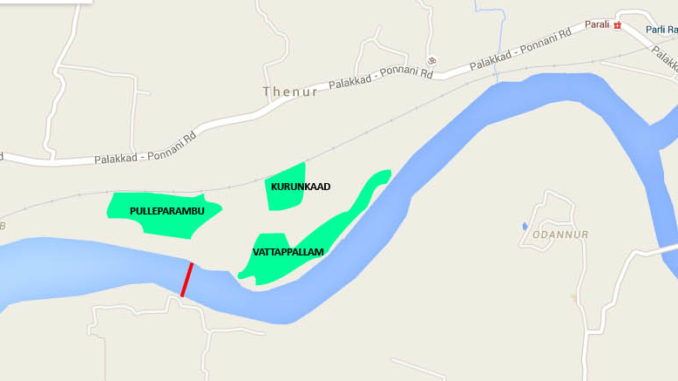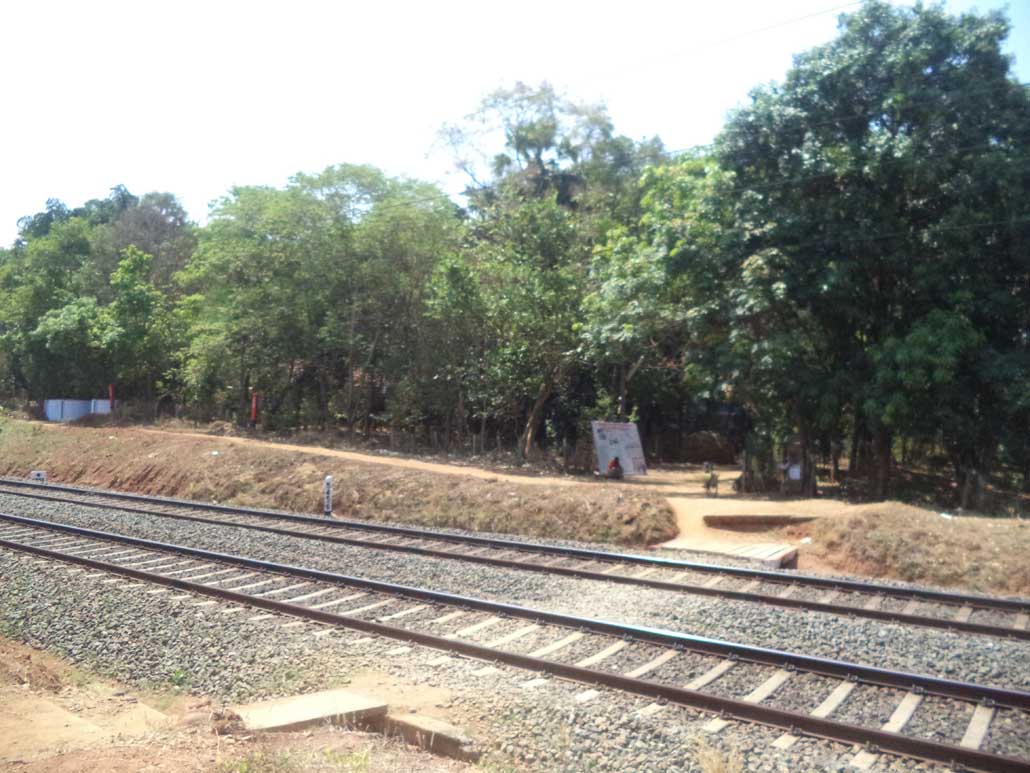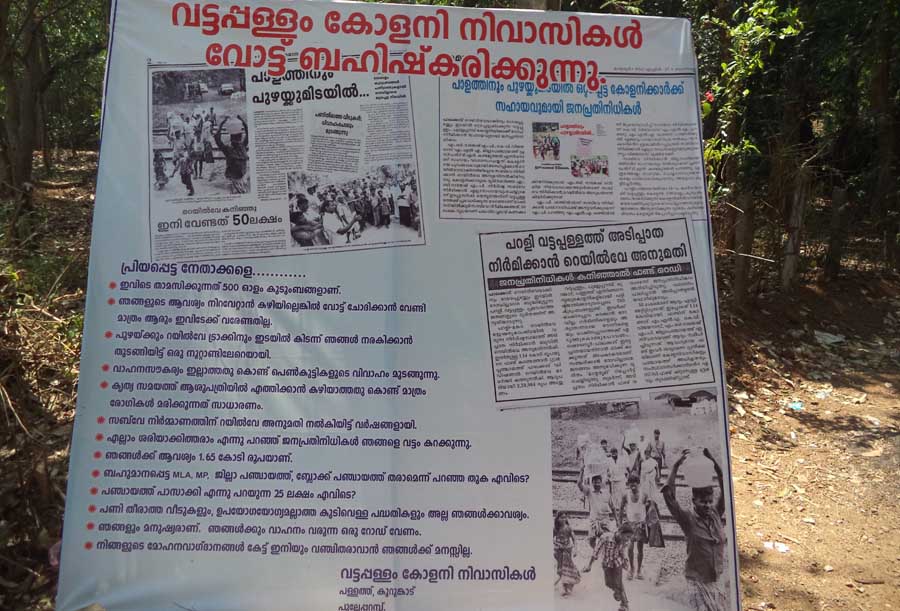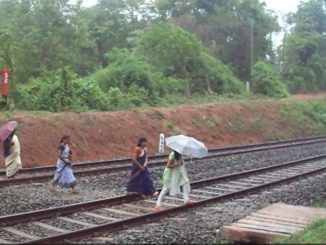
THENUR (Kerala): Travelling between Palakkad and Ottapalam, by rail or road, you are unikely to miss beautiful Thenur village, fifteen kilometres west of Palakkad. Here, the state highway and the rail track play hide-and-seek, curving and cutting through green paddy fields.
This summer, however, Palakkad district has been burning, with day temperature soaring to a record 41.9 degrees Celsius. Thenur’s fields are parch brown. As Kerala goes to the polls on 16 May, a three-metre stretch of the railway track at Thenur has sent political mercury further north: three Dalit colonies here have announced a poll boycott.
Near the railway track, at the entrance to Vattappallam Dalit colony, rises a big flex board in Malayalam: ‘Dear leaders,’ it says in bullet points, ‘If you cannot fulfil our need, none need bother to come here asking for votes. Caught between the railway track and the [Bharathapuzha] river, we have been facing hell for more than a century…. With assurances that everything will be set right, elected representatives have made us run around in circles. We want Rs 1.65 crore. Unfinished houses or un-usable drinking water schemes are not what we want. We too are humans. We too want a motorable road. We are unwilling to be deceived further by your charming promises.’
THE COMMUNITY
About 400 households, many of them related to each other, reside in Vattapppallam Colony, a cluster of three Scheduled Caste colonies (Vattappallam, Kurunkaad, and Pulleparambu). For more than a century, the communities—mostly Cherumars and Parayas, but also a few Thiyyas/Thandaans, and a couple of Nairs and Ezhuthachans—have been living between the river and the railway track.
P.S. Chandran, a 45-year-old resident, said, ‘Our forefathers lived here in British times, even before the rail line was laid.’ Unlike their forefathers, who worked as farmhands, Chandran and a few others have made it to government service with education and reservation for Scheduled Castes, but the majority are daily wage labourers. Women are relatively less educated and many still work in the fields.
All households enjoy satellite TV channels connected via dish antenna (because local operators cannot lay cables across the railway track). Improvement in living conditions has also led to desire for more facilities. Since 1979, the village’s main demand has been an all-weather, motorable road to connect them to the rest of Kerala.
THE DEMAND
When a person suffers a heart attack or snake bite in Vattappallam, the best available option is for four able-bodied men to carry him in a plastic chair for 1.5 kilometres to the railway track, lift him across two curving rail lines, and proceed in a three-wheeler or car to the hospital. Some die on the way.
Almost every family here has a personal tale to tell about how they have suffered due to lack of road connectivity.
Take a short quiz on the situation in Vattappallam. 5 points for a correct guess.
And hence the demand for a road, which is really a demand for a subway under the railway track, to connect Vattappallam with the state highway.
Almost a month ago, flex boards announcing the vote boycott were erected at two bus-stops on the state highway too, but barring the local police who investigated why the boards were put up, no election official or political leader has visited the three Dalit colonies (see Updates).
VOTE BOYCOTT
As I drove to Vattappallam to enquire why they were boycotting, three questions about collective action were upper-most in my mind.
- Does vote boycott help the cause, especially since the winning candidate knows that he/she won without their support?
- How can anyone, especially marginalised Dalits, break patron–client relations with political parties in a state where sectarian politics is practised by parties at the grass roots?
- Are Vattappallam residents using the threat of vote boycott to extract a pre-poll promise from all candidates, and actually likely to vote as usual on May 16?
On reaching the colony, I learned that it was a CPI (M) stronghold. Since 1996, the ward has elected only CPI (M) candidates to the gram panchayat.
Mohanan, a 42-year-old daily wage labourer in the construction industry, said, ‘We made a mistake last year, in the local body elections. We planned to boycott all parties and put up an independent candidate from the village.’ But the CPI (M) persuaded the villagers to accept the party’s nominee, as usual, and elect her. This time, however, the villagers are determined to resist the offers of the CPI (M), he said.
Anti-CPI (M) sentiment is strong now, even among many who have traditionally voted for the party. They acknowledge that the CPI (M) has brought benefits to the village historically, but they are disillusioned with the party for dragging its feet on the road issue.
Residents who have been at the forefront of the road campaign pointed fingers at the Palakkad district committee of the CPI (M). They recalled what a prominent CPI (M) leader had told them: the party’s district committee holds the reins of power on big-ticket spending of MP and MLA local area development funds.
Colony leaders pointed out that all their elected representatives—MP, MLA, and panchayat members in all three tiers—were from the CPI (M), and all panchayat tiers too were ruled by CPI (M). Still, if the required funds have not been released for the road since 2014, it only means that the CPI (M) is in no hurry. The villagers have bought their leaders’ reasoning.
Based on what he has seen in panchayat politics, C. Balan, a 57-year-old retired local government employee, speculated that it could be the CPI (M) local committee’s lack of enthusiasm in convincing the district committee, due to local jealousy on who will get lifetime credit for building the road to Vattappallam.
Mohanan, who has studied till the tenth standard, and worked in the past for CPI (M), appeared distrustful of all parties. According to him, the road is a low priority for the party because ‘Depositing the required amount—the remaining 1.84 crore—with the railways will not fetch the CPI (M) or its elected representatives any commission. The Railways have their own contractors.’
Residents also felt that the CPI (M) takes for granted the Scheduled Caste colony’s support. It is the business-as-usual approach that the youths in Vattappallam are challenging in this Assembly election.
Sumesh, a 27-year-old leader of the poll boycott initiative, is an Economics graduate, secretary of the Dr BR Ambedkar Memorial Reading Room in the colony, and a labourer in the construction industry. According to him, the road has not materialised ‘because no one reacts here’.
In a 45-minute public interaction arranged for me on 1 May, and attended by about 60 villagers, Sumesh explained, ‘All these years, we stood with them, but they did not do it [build the road]. Why should we run after them again? Those who get our valuable vote, they have a responsibility towards us. If they don’t fulfil that even slightly, what should we do? Visiting us only at the time of elections and asking for vote, that is not a correct approach. There is no Opposition here. That is why things are the way they are.’
Chandran, who works in the revenue department, said, ‘All of us in our department work very hard, even several months before an election is announced, to ensure that the polls go well.’ It was awkward for him, therefore, to endorse a poll boycott. ‘The vote boycott is an initiative of the youngsters’, he confirmed, and explained that the village was unitedly rallying behind the idea because the demand for road was long-standing and legitimate.
Balan has heard of another Dalit colony in the panchayat boycotting the vote in last year’s local body elections. He told me that it led to CPI (M) losing the ward to Congress, and within months, the CPI (M), which rules the panchayat, delivered the colony’s demand for drinking water. But Vattappallam’s threat of vote boycott is not inspired by that, he clarified.
Both privately and publicly, I asked the residents whether they were ready to face the consequences of a boycott. While the women, including those associated with Kudumbasree, responded with a deafening silence in the public interaction, more than one man said that if the CPI (M)-controlled panchayat denied benefits under the rural employment guarantee programme, they would challenge such denial under law.
Local party leaders disapproved of the vote boycott. V.V. Haridas, CPI (M) member and ex-panchayat president is one of the residents who has led the struggle for the road in recent years. He assured me that the road will come in two years, ‘Nobody in the district committee has an objection to the road. The new panchayat [elected six months ago] has earmarked Rs 20 lakh for the road, in its development plan. We will get funds from the district and block panchayats too. We should unitedly try to get that, not boycott the election. The key point is, the railways’ [Rs 1.89 crore] estimate is valid for five years, and only one-and-half years are over. We still have time.’
Congress (I) office-bearer Unnikrishnan grew up in the colony but no longer resides here. He said, ‘To convey our needs, and do things in the ministry or Centre, we need a representative. We must elect a representative, demand what we want, and try to get them to do what we want, rather than boycott the election.’
Such views of leaders cut no ice with the male residents, though. ‘Only promises at the time of each election. There is no progress thereafter,’ said P.C. Gopinathan, a doctor in a private ayurveda hospital.
Lakshmi, an agricultural labourer, told me that the elected representatives had promised the road. ‘Why did they not give it? That’s what we ask. Let them answer our question,’ she said. In the public interaction, however, compared to men, women were far less critical of CPI (M) and less inclined to boycott the vote. According to the men, women did not speak up because they were less educated and feared the CPI (M).
On 1 May at least, Vattappallam seemed ambivalent towards vote boycott. Some women said, ‘First the road, then the vote,’ and some men said, ‘We will vote for whoever brings us the road.’ But within minutes, men and women were unsure whether to boycott or to vote for the most convincing candidate who promised the road.
POLITICS AND MORE
Recent village meetings to discuss the road issue have been attended by sympathisers of the three political fronts in Kerala (NDA, LDF, and UDF). As the public interaction ended, ex-panchayat president Haridas surfaced near the venue. When I asked him why he had kept away from the meeting, he replied, ‘Because it was not convened by me or the CPI (M)’.
According to Haridas, a 10-member, bipartisan committee for the road issue had been formed in the village, but of late, meetings were being convened bypassing that committee. He said he knew the political background of everyone there, and the recent meetings, including for vote boycott, were being organised by the BJP.
One resident told me privately that the village was not entirely united even on the road issue. Headload workers in the village, for example, benefited from the absence of a road; once the road is ready, demand for their service—transporting goods across the rail track—will decline substantially. This summer, when light commercial vehicles came to the colony, via a small underpass (Railways forbids its use), some colony residents alerted the Railways and gave them the vehicle number; the railway promptly swung into action, he said.
Despite difference of opinion along various axes—gender, age, strength of party ties, and livelihood—in the colony, the leaders of the poll boycott were confident that all would stand united in the event of a poll boycott. They said that the final decision to vote or boycott will be taken by consensus after holding a few more meetings.
For now, the Dalits in Vattappallam are showing the red signal to the CPI (M). But there are ten days to go. What will happen on 16 May in Booth 116? Stay tuned.
Read what happened on polling day
Updates from Vattappallam
Acknowledgement: I am grateful to Suraj Jacob for comments on a draft, and Vinu Palissery for inputs and assistance in the public interaction organised at Vattappallam on 1 May 2016. Inadequacies mine.







